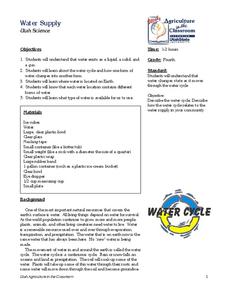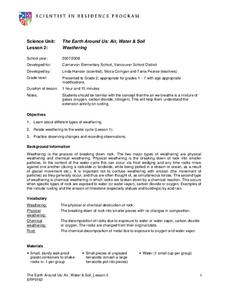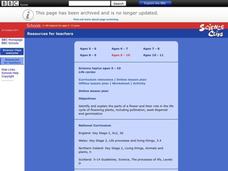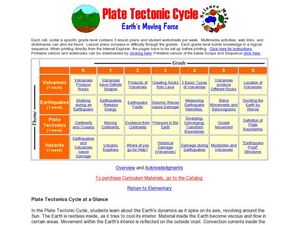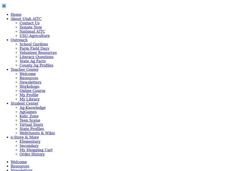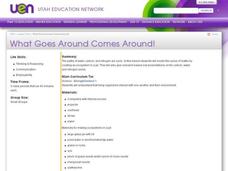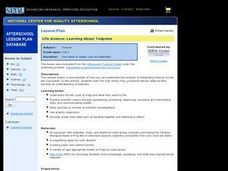Curated OER
What Goes Around Comes Around
Students investigate how the ocean plays a part in the water cycle. In this earth science lesson, students locate a puddle outside and mark it with chalk. Students observe the changes in the water during the next two days.
Curated OER
Water Supply
Fourth graders complete three activities. In this water supply lesson, 4th graders learn that water can exist in different forms and watch a demonstration of each form. Students explore the water cycle and make a water cycle using the...
Curated OER
Sustainable Southern Belize: Coral Health Lesson Plan
Fifth graders investigate coral reefs and the dangers they face by labeling and drawing. In this oceanography lesson plan, 5th graders view a PowerPoint presentation of photographs of coral reefs in Belize. Students investigate and...
Curated OER
Weathering
Second graders explore weathering and how the water cycle plays a part in weathering. In this weathering lesson, 2nd graders put gravel and sugar cubes in a jar and shake, simulating weathering. Students use the scientific method to do...
Curated OER
Microbial Influence on Earth's Systems
Learners identify the different biogeochemical cycles on Earth. In this biology activity, students observe microbes under a microscope. They compare and contrast respiration and photosynthesis.
Curated OER
Let's Take a Rock Apart
Students take a crushed rock and sort the remains of the rock minerals into different categories based on the different properties. In this sorting lesson plan, students learn what makes up a rock and how to sort something into categories.
Curated OER
Food: Early American Food Cycles Web Quest
Students complete a Web Quest on ways that Native Americans hunted for, harvested, stored, and prepared food and what types of natural foods were eaten. In this early American food cycles lesson, students discover many of the ways early...
Curated OER
Life Cycles
Students identify and explain the parts of a flower and their role in the life cycle of flowering plants. In this online plant biology lesson, students explore the processes of pollination, seed dispersal, and germination. Extension...
Curated OER
Plate Tectonic Cycle
Students explore the Earth's movements by completing worksheets. In this plate tectonics lesson, students define such natural disasters as volcanoes, earthquakes, tsunamis and mudslides and discuss their connections to plate tectonics....
PBS
Breaking it Down
After challenging themselves to correctly choose the form of erosion and length of time required for a given landform to develop, earth science class members model mechanical and chemical weathering with various lab demonstrations over...
Chicago Botanic Garden
Carbon, Greenhouse Gases, and Climate
Climate models mathematically represent the interactions of the atmosphere, oceans, land, sun, surface, and ice. Part two in the series of four lessons looks at the role greenhouse gases play in keeping Earth warm and has participants...
Curated OER
Water: Naturally Cleaned
Students use stream trays covered in different types of rocks or soil to investigate infiltrates and runoff. In this water pollution instructional activity, students work in groups with stream trays that have different substrates. They...
Curated OER
Water, Water Everywhere
Students explore water. In this water cycle lesson, students conduct a scientific investigation that requires build a terrarium models of the earth. Students record their observations of the changes regarding water in the terrarium.
Curated OER
Water, Water Everywhere
Students study the location of Earth's water and study the water cycle using a terrarium. In this water study instructional activity, students study a model globe for the Earth and find Alaska. Students locate the bodies of water and...
Curated OER
Franklin Mountains
Students review the steps of the rock cycle. In groups, they identify the natural forces that cause weathering and erosion. They describe how sedimentary, metamorphic and igneous rocks might be formed in nature to end the lesson.
Curated OER
Earthquakes: Fifth Grade Lesson Plans and Activities
After learning about P waves and S waves, fifth graders view the intensity of earthquakes by examining seismographs and images of earthquake damage. Young scientists then forecasting future quakes by analyzing data about earthquakes...
Curated OER
Plate Tectonics: Kindergarten Lesson Plans and Activities
This unit focuses primarily on plate tectonics and plate boundaries surrounding continents. It contains pre- and post-lab sections that walk young geologists through plate movements in order to visualize what's going on inside Earth.
Curated OER
Geology: Famous Rock Groups
Fourth graders, in groups, use books to identify types of rocks. They examine the rocks and complete rock evidence charts. Students compose definitions for each rock type and determine uses for igneous rocks by early mankind.
Curated OER
Rock Discovery
Fourth graders identify rocks in this discovery lesson by examining rock characteristics and processes. They identify basic properties of minerals and rocks. They revise their theories of the natural world, once they see and learn new...
Curated OER
Heat Up the Floating Plates
Eighth graders research the connection between the convection currents within the mantle of the earth and the moving of Earth's plates. A connection to lessons at previous grade levels on the rock cycle and important background...
Curated OER
Environment" The Mining Cycle
Students explore the world of mining and explain its importance in daily life. After describing how companies search for mineral deposits, they examine the environmental consequences of mining as well as the positive aspects. The...
Curated OER
Ride the Wild Leaf Cycle
Fourth graders explore plant life by completing an Internet activity. For this botany lesson, 4th graders identify the types of plants that grow locally and the different soils they utilize to survive. Students read assigned text about...
Curated OER
What Goes Around Comes Around!
Students create an ecosystem in a jar to show a model of the water, carbon, and nitrogen cycle. Working in small groups, they research and present orally the information they find on this cycle.
Curated OER
Life Science- Learning About Tadpoles
Students investigate a frog's life cycle. In this tadpole lesson plan, students observe tadpoles in an aquarium and record results. Students fill in a KWL chart as an assessment.



